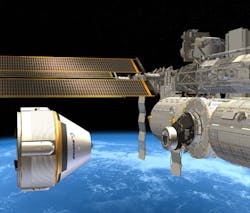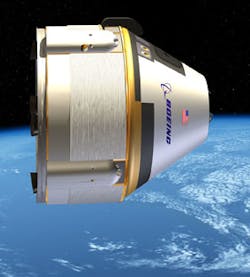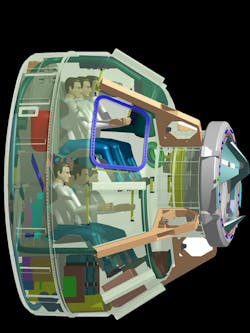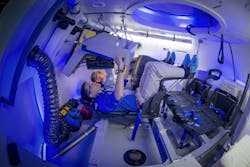NASA selects Boeing CST-100 as next American spacecraft, awards $4.2 billion under Commercial Crew Program
HOUSTON, 18 Sept. 2014. Boeing (NYSE:BA) won an award of $4.2 billion from NASA to build and fly the United States’ next passenger spacecraft. Boeing’s Crew Space Transportation (CST)-100 is being developed as part of NASA’s Commercial Crew Program, which aims to resume U.S.-based flights to space by 2017.
The CST-100 will transport up to seven passengers or a mix of crew and cargo to the International Space Station (ISS) and other low-Earth orbit destinations.
“Boeing has been part of every American human space flight program, and we’re honored that NASA has chosen us to continue that legacy,” says John Elbon, Boeing vice president and general manager, Space Exploration. “The CST-100 offers NASA the most cost-effective, safe and innovative solution to U.S.-based access to low-Earth orbit.”
Under the Commercial Crew Transportation (CCtCap) phase of the program, Boeing will build three CST-100s at the company’s Commercial Crew Processing Facility at Kennedy Space Center in Florida. The spacecraft will undergo a pad-abort test in 2016 and an uncrewed flight in early 2017, leading up to the first crewed flight to the ISS in mid-2017.
Boeing recently completed the Critical Design Review (CDR) and Phase Two Spacecraft Safety Review of its Crew Space Transportation (CST)-100 spacecraft, becoming the only competitor for NASA’s Commercial Crew program to pass a CDR as well as complete all CCiCap milestones on time and on budget.
“The challenge of a CDR is to ensure all the pieces and sub-systems are working together,” explains John Mulholland, Boeing Commercial Crew program manager. “Integration of these systems is key. Now we look forward to bringing the CST-100 to life.”
A unit of The Boeing Company, Boeing Defense, Space & Security is one of the world's largest defense, space and security businesses specializing in innovative and capabilities-driven customer solutions, and the world’s largest and most versatile manufacturer of military aircraft. Headquartered in St. Louis, Boeing Defense, Space & Security is a $33 billion business with 56,000 employees worldwide.

Courtney E. Howard | Chief Editor, Intelligent Aerospace
Courtney enjoys writing about all things high-tech in PennWell’s burgeoning Aerospace and Defense Group, which encompasses Intelligent Aerospace and Military & Aerospace Electronics. She’s also a self-proclaimed social-media maven, mil-aero nerd, and avid avionics and space geek. Connect with Courtney at [email protected], @coho on Twitter, on LinkedIn, and on Google+.




